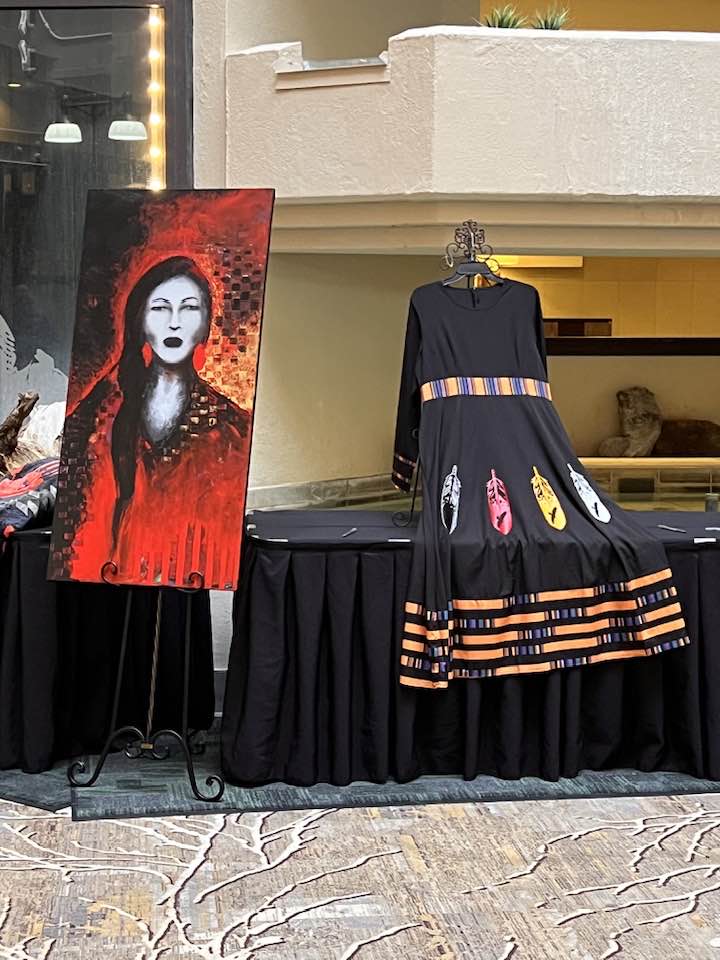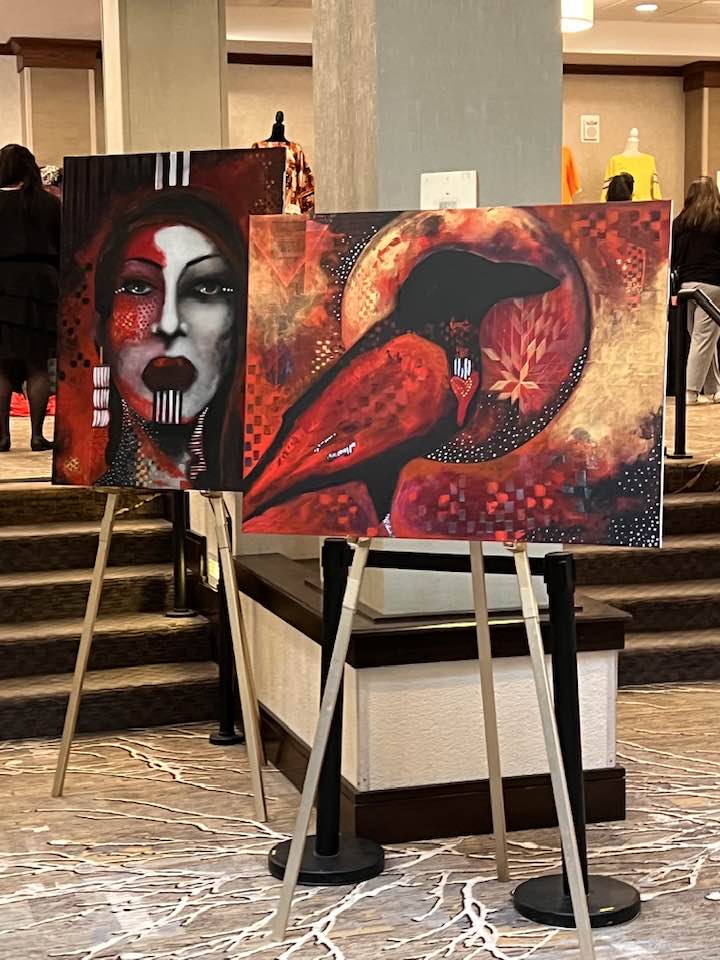Resilience in red: MMIW advocacy through the Red Dress Gala

Lily Mendoza, founder of Red Ribbon Skirt Society moderated a roundtable discussion titled “All Our Relatives” with guest speakers including artist Jennifer White, owner of Post Pilgrim Gallery, Leya Hale, director of documentary “Bring Her Home,” and artist Rachel Berg, owner of Liv Artfully in Sioux Falls. (Photo by Chantelle Blue Arm)
RAPID CITY – Lily Mendoza, a dedicated advocate for missing and murdered Indigenous women (MMIW) from Rapid City, has been at the forefront of raising awareness and fighting for justice for Indigenous people, particularly women, girls, two-spirit and transgender people who have gone missing or have been victims of violence.
Growing up on the Cheyenne River Indian Reservation, Mendoza has witnessed firsthand the devastating impact of MMIW cases on families and communities. Driven by a deep sense of justice, Mendoza has become a passionate voice for those who have been silenced and forgotten.
In 2016 Mendoza founded a grassroots organization in Rapid City, called the Red Ribbon Skirt Society that provides support services to the families of missing and murdered Indigenous women. Through her advocacy work, she has organized rallies, marches, and community events to honor the memories of the missing and murdered women and to call for a systemic change that addresses the root causes of violence against Indigenous women.
Mendoza’s efforts have not only brought attention to the issue of MMIW in South Dakota and nationally but have also inspired others to join the movement and help advocate for those who have been impacted by MMIW.
“When I started this society, I wanted to know what to call it. We wanted it to be a woman’s society, because you don’t see many societies anymore,” Mendoza told Lawrence Diggs of the South Dakota Humanities Council via their May 2 podcast. “Red is the color that the spirits can see. We believe that the women that have passed on, are watching us, especially when we are working with their families.”
Mendoza’s most recent community event, the Red Dress Gala, held at the Rushmore Holiday Inn in Rapid City on Saturday May 4, was an elegant and powerful fundraising event that combined the sophistication of a gala with the symbolic significance of the red dress which has become a powerful emblem in MMIW advocacy. The red dress represents the spirits of those who have been lost while raising awareness about the ongoing crisis of violence against Indigenous women and girls, two-spirit and transgender people.
The evening included a social, a silent auction, a formal dinner, round table discussions, and a calling out of MMIW, MMIR and MMIP names. The fundraiser served as a platform for community members, activists, and allies to amplify their indigenous voices and share stories to honor the spirits of their relatives.
The Red Dress Gala began with a silent auction and social in the atrium of the Holiday Inn Rushmore where paintings, clothing and jewelry were on display.
A formal dinner was served in the Dakota Ballroom where the majority of guests dressed in red attire as a show of solidarity and remembrance.
Special guest Joseph Marshall who wrote the book called “Sing for the Red Dress.” Marshall addressed attendees via video as he was in Vermillion to receive an honorary doctorate degree.
“Sing for the Red Dress” is about the fictional Smokey River Tribal Police Force who take a stand against the abduction of 12 Native girls believed to have been taken for sex trafficking to oil field workers. In a daring mission to rescue the girls, members of the tribal police, alongside allies like Gavin Lone Wolf and Katherine Hill, courageously infiltrate the oil camps. As they delve deeper, they unearth a sinister and determined villain who will go to great lengths to preserve his control and dominance.
A roundtable discussion took place next titled “All Our Relatives” with guest speakers Artist Jennifer White, owner of Post Pilgrim Gallery, Leya Hale, director of documentary “Bring Her Home,” and Artist Rachel Berg, owner of Liv Artfully in Sioux Falls.
Mendoza introduced Rachel Berg as her niece, “We’ve commissioned Rachel to work on a sculpture that represents missing and murdered indigenous women. We will be the only ones in the nation that will have a statue in memory of missing and murdered indigenous women.”
A model of the future “Justice” sculpture was displayed in the atrium. Berg explained her choice to use a jingle dress dancer for the sculpture. “A big part of creating was her was her dress. I wanted to make sure that just by looking at her you could hear the jingles.”
Leya Hale is from the Sisseton Wahpeton Dakota and Diné Nations, currently residing in Saint Paul, Minnesota with her partner and children. As a producer at Twin Cities PBS, Leya gained recognition for her inaugural full-length documentary, “The People’s Protectors,” which was funded by Vision Maker Media and secured the prestigious 2019 Upper Midwest Emmy Award for Best Cultural Documentary.
In “BRING HER HOME,” the narrative unfolds around three Indigenous women: an artist, an activist, and a politician. Together, they strive to seek justice and pay tribute to their family members who have fallen victim to the alarming trend of Missing and Murdered Indigenous Women. Amidst the enduring impact of historical wounds, each woman embarks on a quest for restoration, all while confronting the oppressive structures that have perpetuated this heartbreaking crisis.
The society helps families attend funerals, traditional memorials, and also assists with search and rescue efforts. They have also helped families “Bring Her Home” safely or sadly, deceased. Bringing home murdered or missing women involves grappling with profound loss while advocating for meaningful change to honor the memories of lost loved ones. Red Ribbon Skirt Society members help families navigate through this difficult time by providing emotional and financial support.
“The money that is raised during the Gala helps us help the families. We might help them with funeral expenses, traditional wake services memorials, gas to travel to different reservations if they have to go there and see their family. One of the things we have actually used our funding for is to ‘Bring Her Home,” Mendoza said. “We had an instance when we had a woman that was in a funeral home in Utah. The funeral home wouldn’t release her because they still owed money to bring her home.”
(Contact Ernestine Anunkasan Hopa at editor@nativesunnews.today)
The post Resilience in red: MMIW advocacy through the Red Dress Gala first appeared on Native Sun News Today.


